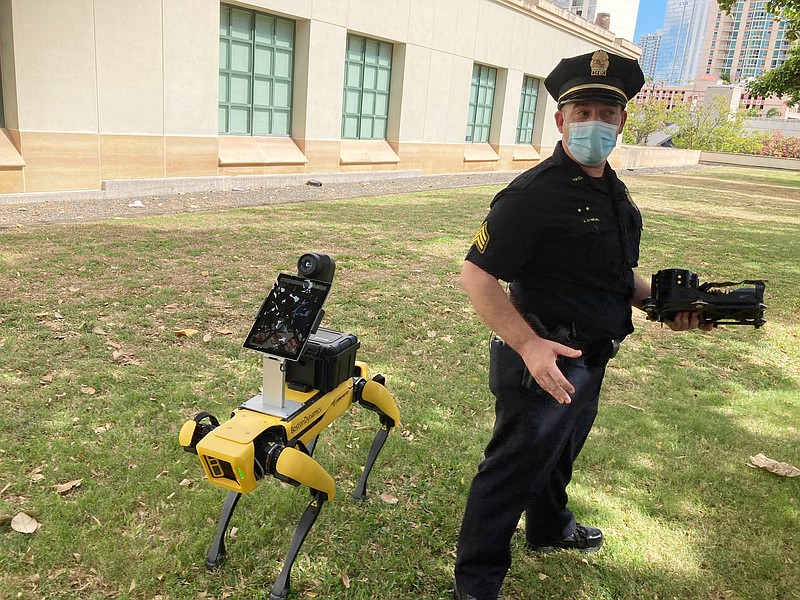HONOLULU (AP) - If you're homeless and looking for temporary shelter in Hawaii's capital, expect a visit from a robotic police dog that will scan your eye to make sure you don't have a fever.
That's just one of the ways public safety agencies are starting to use Spot, the best-known of a new commercial category of robots that trot around with animal-like agility.
The handful of police officials experimenting with the four-legged machines said they're just another tool, like existing drones and simple wheeled robots, to keep emergency responders out of harm's way as they scout for dangers. But privacy watchdogs - the human kind - warn that police are secretly rushing to buy the robots without setting safeguards against aggressive, invasive or dehumanizing uses.
In Honolulu, the police department spent about $150,000 in federal pandemic relief money to buy their Spot from robotics firm Boston Dynamics for use at a government-run tent city near the airport.
"Because these people are houseless, it's considered OK to do that," said Jongwook Kim, legal director at the American Civil Liberties Union of Hawaii. "At some point it will come out again for some different use after the pandemic is over."
Acting Lt. Joseph O'Neal, of the Honolulu Police Department's community outreach unit, defended the robot's use in a media demonstration earlier this year. He said it has protected officers, shelter staff and residents by scanning body temperatures between meal times at a shelter where homeless people could quarantine and get tested for COVID-19. The robot is also used to remotely interview individuals who have tested positive.
"We have not had a single person out there that said, 'That's scary, that's worrisome,'" O'Neal said. "We don't just walk around and arbitrarily scan people."
Police use of such robots is still rare and largely untested - and hasn't always gone over well with the public. Honolulu officials faced a backlash when a local news organization, Honolulu Civil Beat, revealed the Spot purchase was made with federal relief money.
Late last year, the New York Police Department starting using Spot after painting it blue and renaming it "Digidog." It went mostly unnoticed until New Yorkers starting spotting it in the wild and posting videos to social media. Spot quickly became a sensation, drawing a public outcry that led the police department to abruptly return Digidog to its maker.
"This is some Robocop stuff, this is crazy," was the reaction in April from Democratic U.S. Rep. Jamaal Bowman. He was one of several New York politicians to speak out after a widely shared video showed the robot strutting with police officers responding to a domestic-violence report at a high-rise public housing building in Manhattan.
Days later, after further scrutiny from elected city officials, the department said it was terminating its lease and returning the robot. The expensive machine arrived with little public notice or explanation, public officials said, and was deployed to already over-policed public housing. Use of the high-tech canine also clashed with Black Lives Matter calls to defund police operations and reinvest in other priorities.
The company that makes the robots, Boston Dynamics, it's learned from the New York fiasco and is trying to do a better job of explaining to the public - and its customers - what Spot can and cannot do. That's become increasingly important as Boston Dynamics becomes part of South Korean carmaker Hyundai Motor Company, which in June closed an $880 million deal for a controlling stake in the robotics firm.
"One of the big challenges is accurately describing the state of the technology to people who have never had personal experience with it," Michael Perry, vice president of business development at Boston Dynamics, said in an interview. "Most people are applying notions from science fiction to what the robot's doing."
For one of its customers, the Dutch national police, explaining the technology includes emphasizing that Spot is a very good robot - well-behaved and not so smart after all.
"It doesn't think for itself," Marjolein Smit, director of the special operations unit of the Dutch national police, said of the remote-controlled robot. "If you tell it to go to the left, it will go to the left. If you tell it to stop, it will stop."
Earlier this year, her police division sent its Spot into the site of a deadly drug lab explosion near the Belgian border to check for dangerous chemicals and other hazards.
Perry said the company's acceptable use guidelines prohibit Spot's weaponization or anything that would violate privacy or civil rights laws, which he said puts the Honolulu police in the clear. It's all part of a year-long effort by Boston Dynamics, which for decades relied on military research grants, to make its robots seem friendlier and thus more palatable to local governments and consumer-oriented businesses.

